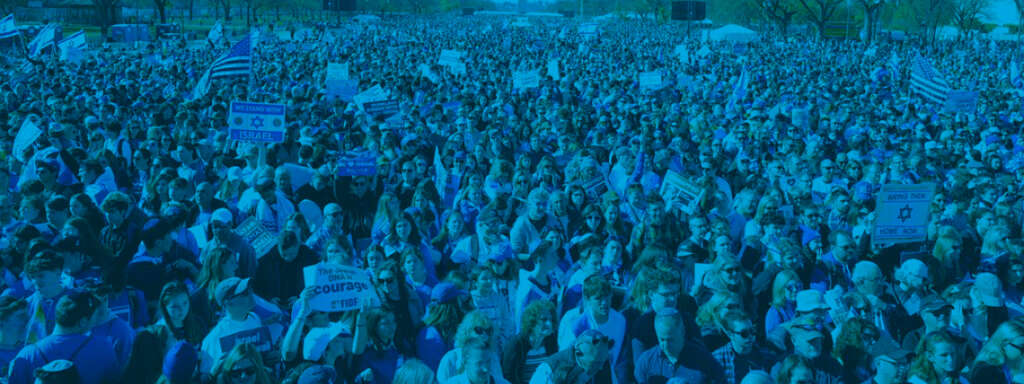Research shows that one-on-one conversations are among the most influential sources of information on the conflict and rising antisemitism. Keeping lines of communication open with interested friends provides a safe space for complex discussions.
Key Messages
 When you are engaging in advocacy, it can help to have some language to use as a starting point. Below are some suggestions to use as you reflect on what you want to say in your own voice.
When you are engaging in advocacy, it can help to have some language to use as a starting point. Below are some suggestions to use as you reflect on what you want to say in your own voice.
Note that this page may be updated as the situation evolves.
Regarding the Conflict
“Hamas has broken ceasefires twice in the past few months. They killed mothers, children, and the elderly, and are still holding hostages. A ceasefire is not one-sided and must start with Hamas releasing the hostages, laying down their arms, turning in those responsible for October 7, and allowing Israelis to be safe in their homes.”
“If we are to have the lasting peace we all want, Hamas must be disarmed and disbanded so they cannot attack Israel again and again murder so many mothers, children, and grandparents.”
“We share in the grief for the loss of lives in the region. Our goal is a lasting peace and one that allows all people to live safely.”
“We ask everyone to join us in our call for Hamas to release all hostages and to lay down their arms so that the work of creating a lasting peace can begin.”
Increasing Antisemitism
“Sadly, we’re witnessing a rapid increase in Jew hatred in Greater MetroWest – threats and violence against Jewish people, institutions, and Jewish-owned businesses. Hamas supporters, their rallies, and their targeting of Jews doesn’t do anything to advance peace.”
“We know Americans reject hatred and extremism and we invite all people to join us in taking action against antisemitism – so that Jews can feel safe in our community and in schools and public spaces.”
“We will work with everyone who believes in peace to make it clear that in Greater MetroWest we will not stand for antisemitism and racism.”
Having Difficult Conversations
 Having an effective conversation with a non-Jewish friend or colleague really is possible! Here’s everything you need…
Having an effective conversation with a non-Jewish friend or colleague really is possible! Here’s everything you need…
1. Establish an environment for a mutually respectful discussion.
- Develop guidelines and goals for the conversation, such as seeking to build greater understanding, complicate rather than oversimplify, or to foster empathy for the people impacted by the climate.
- Strive for a common language based on respect when discussing complex issues. Recognize and challenge language that is meant to inspire anger and turn people against each other.
- Select a text (or video) from a credible source to anchor the conversation in a shared set of facts. For more on this, see #7.
- Recognize that antisemitic bias is universal, and that it can be implicit (unconscious) or explicit (conscious). Notice the thought processes or emotions that may come up for you with curiosity rather than judgment.
- Consider the time and place. As violence unfolds or the conflict escalates, people may be in greater need of emotional support rather than educational opportunities.
2. Position yourself as a learner, not an expert.
- The Israeli-Palestinian conflict has roots that predate current events, and there are a wide variety of historical, religious, political and cultural factors in play. It is complex, nuanced and multi-layered.
- In order to truly be able to discuss the conflict, avoid oversimplification which only leads to stereotyping and bias. The best way to do that is to read a variety of informed sources from different perspectives.
- Accept and expect that there won’t be closure at the end of the conversation nor will all questions be answered and resolved. That may cause some discomfort.
3. Choose language that helps to humanizes the people living in the region.
- Use precise language. For example, refer to Israel as the State of Israel or the Jewish state, as opposed to “the Zionist entity,” “the Jews,” or other euphemisms. Likewise, distinguish between Hamas or other terrorist organizations and the Palestinian people.
- Challenge the use of dehumanizing depictions of individuals and groups of people as non-human, animals, vermin, or insects. Watch out for stereotypes and myths that depict people as all “good” or all “evil” based on their identity group.
- Provide examples, images, narratives, quotes and other material that humanizes people and fosters empathy.
4. Make connections across history, rather than direct comparisons.
- Explore the history of the Jewish people’s origins in the land of Israel, and contextualize the current conflict as part of a long history of different empires and peoples asserting a claim to the region.
- People will often use language and aspects of the Holocaust and Nazism to demonstrate the seriousness of discrimination or bias-motivated violence that is taking place.
- Making direct comparisons to Nazism or the Holocaust is painful and potentially retraumatizing to Jewish people, especially those who are survivors of the Holocaust or their descendants. The Holocaust was not a “lesson” for the Jewish people to learn. Intergenerational and historical trauma may trigger compounded pain during this conflict.
- Explore definitions and origins of terms that are used to describe mass atrocities in history. Using terms like “genocide” and “ethnic cleansing” inaccurately in order to provoke a strong reaction can further cause harm.
5. Center and affirm the concerns that Jewish people express about safety.
- As antisemitic incidents around the world tend to spike when there is a conflict in Israel, validate the safety concerns that Jewish people express.
- Remember that safety and comfort are not the same. Comfort is when one’s mind is at ease, whereas discomfort can mean one’s mind is challenged. Safety refers to the absence of risks and threats of harm, and when someone feels unsafe they may be in physical or mental distress. Geopolitical conflicts can be uncomfortable to talk about, however Jewish communities face specific risks when the Israeli-Palestinian conflict is in the news, including threats of violence, vandalism of Jewish synagogues, cemeteries and community buildings and exclusion from participation in everyday life.
- Watch for and challenge the antisemitic idea that Jewish people are deserving of violence, displacement or retribution.
- Anticipate and seek to hold space for Jewish people to feel fear for their safety.
6. Challenge language that holds Jewish individuals and groups accountable for the actions of the state of Israel.
- Understand that holding a community or person accountable for the actions of a nation and its government has a history resulting in violence and oppression.
- Challenge voices that demand Jewish people condemn Israel’s policies and actions, reject Zionism or otherwise speak on behalf of the Israeli government. For many, Zionism and a connection to the land of Israel is integral to their practice and identity as Jewish people.
- Remember that Jewish people hold a wide range of opinions related to the government of Israel and its actions and treating a Jewish person or group as representative of all Jewish people is not fair and is tokenizing.
- Identify anti-Israel vandalism, attacks and demonstrations that target Jewish people or community buildings as acts of antisemitism, such as spray-painting “Free Palestine” on a synagogue.
7. Ground conversations in reliable informational resources.
- Identify a text, video or other resource from a credible organization or expert to anchor the conversation.
- Start or continue your learning journey about the history of antisemitism, its roots, and contemporary manifestations.
- Recognize that misinformation and disinformation are widespread, especially as violence and conflicts are unfolding. Practice media literacy by assessing the quality of the sources you find and share.
- Be sure to include nuanced and different perspectives and minimize one-sided points of view.
8. Center empathy by listening to the voices of those people directly affected by the conflict.
- Listen to and center voices that have personal experiences, familial ties and trauma associated with this region. War and violent conflict have dire consequences for ordinary people of any or no political ideology.
- Ask and listen to how individuals define their identity as Jewish people, Israeli people, or Zionists. Identity is complex and not everyone identifies in the same way.
- Hold space for the distinct experiences of pain and trauma that Jewish and Palestinian people carry from this conflict. Listening to different peoples’ narratives without attempting to correct or rank them builds empathy and perspective-taking skills.
9. Acknowledge your worldview and perspective to avoid projecting onto the Israeli-Palestinian conflict.
- Though news and social media can be informative, people living outside of Israel and the Palestinian territories will always have a limited perspective on the conflict compared to a person who lives in the region.
- Center voices of those who are in the region and most impacted by the conflict.
- Resist the temptation to directly compare the Israeli-Palestinian conflict to other identity-based issues in the United States or elsewhere. Direct comparisons can cause more harm and confusion rather than building understanding.
10. Conclude the discussion with next steps for learning and supportive actions.
- Identify one or more questions to continue exploring beyond the conversation. Learning is a journey.
- Exchange strategies for applying pro-social and supportive behaviors online and in person.
- Accept that violence and geopolitical conflicts can create strong emotional reactions, including feelings of despair and hopelessness; resolve to build connection and strengthen social ties within your community.
- Continue to learn more about the unfolding events and how to support people in your community who are impacted. ADL will provide updates as events unfold.
Engaging on Social
 We know that one of the most influential and trusted sources of information on the conflict are people’s friends and families.We’re not going to be able to use social media to change the world but we can use it to share messages and information so our non-Jewish colleagues, friends and family can understand the conflict and rising antisemitism from our perspective. Here are some guidelines to help you engage.
We know that one of the most influential and trusted sources of information on the conflict are people’s friends and families.We’re not going to be able to use social media to change the world but we can use it to share messages and information so our non-Jewish colleagues, friends and family can understand the conflict and rising antisemitism from our perspective. Here are some guidelines to help you engage.
Stay safe, stay positive and don’t share the negative
- Try and be positive whenever possible.
- Follow community accounts and friends.
- Amplify (re post, share) others.
Community accounts to follow and share:
Jewish Federation of Greater MetroWest NJ
Facebook: jfedgmw
Instagram: jfedgmw
Do not share harmful or negative images and posts. Not only are you helping the people who created the messages, but you may be accidentally boosting their popularity while exposing your friends and family to hateful content.
We believe it is most reflective of the Jewish tradition and culture in our community to post and re-post inspiring and educational stories, memes and images. Of course, it’s absolutely up to you, but in keeping with tikkun olam, making sure your online presence is positive is best for all of us. This includes ensuring that you are not being overly dramatic or over stating things in your post: a little bit of moderation goes a long way. Remember that a lot of people use hyperbole, exaggeration and half-truths as a communications tool to break through the barrage of information.
Being inflammatory may work in the short-term, but it does so at a long-term cost: credibility. Do not respond to hateful messages or attacks. Take a screenshot, block individuals and report them to the social media platform. If you are feeling threatened, contact the police and then report the incident. Never share personal information online.
Help Each Other Out, Not the Trolls
- Help us extend our reach – follow official community accounts and those of community leaders — Commenting and sharing boosts our reach, so thank you for your help
- Be thoughtful — try to engage in conversations where you may actually be able to influence someone’s perspective
- Don’t be quick to call someone an antisemite: try and address the challenging content rather than make assumptions about the person posting it. If a friend or family member is sharing something that is untrue or harmful, try reaching out via a direct message as a first step
- Don’t feed the “trolls”: many people are online specifically to provoke a reaction from you. Don’t give them what they want – ignore them, block them, be the bigger person
- Sarcasm isn’t an effective way to convince someone that you’re right
The Truth is Our Friend
- There is a lot of false information circulating – make sure you verify things before you share them
- There are some pretty common myths and stereotypes about our community, Israel and the conflict – get to know some of the more common ones
- Some great resources can be found here.
Be Kind to Yourself
- Make sure you know your boundaries, and step away from social media if you need to
- There are mental health resources available to you: reach out if you need help
Links to Trusted Information Sources
 We’ve compiled a list of trusted sources of news and information about Israel, antisemitism and the Jewish community.
We’ve compiled a list of trusted sources of news and information about Israel, antisemitism and the Jewish community.
News Outlets
Government News Sources
- X (Twitter): COGAT
- X (Twitter): Israel Foreign Ministry
- X (Twitter): Israel Defense Forces
Information Sheets
- https://www.factsandlogic.org/pr-for-israel
- https://www.ajc.org/resources/israel
- https://www.jewishvirtuallibrary.org/israel
- https://www.adl.org/resources/tools-and-strategies/education-glossary-terms
Social Media
- Jewish Federation of Greater MetroWest
Facebook: jfedgmw
Instagram: jfedgmw - Jewish Federations of North America (JFNA)
Facebook: jfederations
Instagram: jfederations
Use the hashtag #SupportIsrael and #IamGMW when posting on social.

